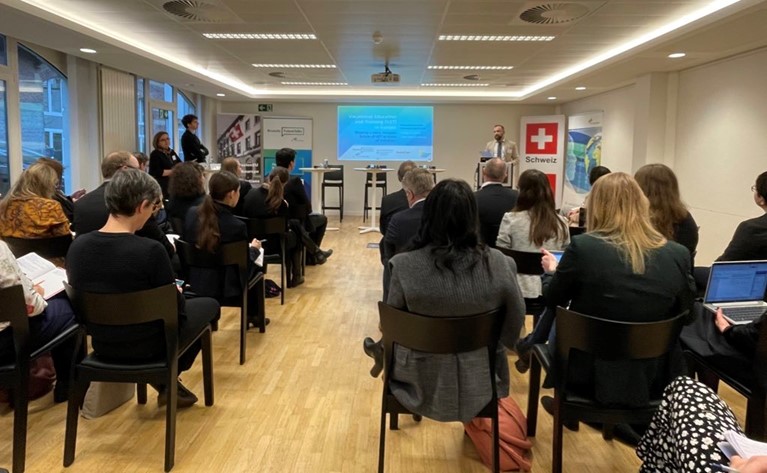Brussels Future Talks: looking into a more inclusive future of VET in times of transition
14/03/2024

On 12 March 2024, the Mission of Switzerland to the EU, SwissCore and DLR Projektträger organised a new series of its “Brussels Future Talks” evening events. On this occasion, the talk was focused on discussing tools and projects that contribute to building a more inclusive and innovative development of Vocational and Educational Training (VET) in the context of the European Year of Skills.
Anna Barbieri, European Commission, Team Leader Apprenticeships in DG “Employment, Social Affairs, Inclusion”, set the scene by introducing the participants to the different powers that the VET sector has. Ms Barbieri stated that VET can be a driving force that supports Europe to tackle European challenges in times of disruption but for that “we need an innovative and modern VET system.” To reach that point, she indicated that improving the attractiveness of VET is essential. The European Commission is already working on initiatives for VET students to tell their own stories, such as the Meet the Champions of Excellence gathering that took place in Brussels, and that in which EARLALL and its members participated. Other initiatives such as the European Alliance for Apprenticeship or the Centers for Vocational Excellence (in which EARLALL actively takes part) are also contributing to improving the attractiveness of VET. She stressed that the next European Commission’s main challenges will be to enhance the attractiveness of VET and to promote transversal skills.
The evening continued with the discussion and presentation of good practices and perspectives from Switzerland, Germany and Latvia.
Swiss colleagues presented the VET strategy which is looking towards 2030. Currently, they are developing how to deliver the rights skills for each individual that also meets the labour market needs, and how to tackle the skills shortages. They presented a good practice “Solar Apprenticeships” which is a new professional profile: Sollar Installer + Sollar Fixer. The Swiss certification (EBA) for solar fitters is completed after a two-year apprenticeship, while the EFZ for solar installers can be obtained after three years of training. The two training plans were developed by Swissolar in the short term. This comes from an industry demand as they were lacking workers in this, so VET and industry cooperation. It is integrated under the professional branch of building careers.
In the case of Germany, the country has a long history within VET and apprenticeships. Nevertheless, the authorities are continuously looking into how to modernise the different VET curricula and professional profiles. To this end, the German Federal Institute for VET (BIBB) works to identify future challenges in VET, stimulate innovation in national and international vocational systems and develop new, practice-oriented solutions for VET and CVET. Latvia has had to contend with the negative perception of VET, therefore improving the attractiveness and the quality of VET is among its top priorities as a country.
The panel discussion was focused on how to empower European VETs in challenging times. Speakers addressed topics such as how to integrate disadvantaged people into the labour market or gender equality issues. All in all, panellists agreed that we are on our way to building a more inclusive future for VET, but that a long road remains ahead.




